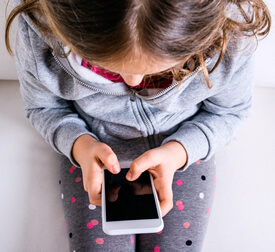Can My Ex Take My Child’s Cell Phone? PART TWO
In this two-part series, we examine the benefits and detriments of providing a cell phone to a son or daughter under divorced parenting circumstances. Parents who divorce or separate need to develop a parenting plan with agreed terms and conditions, along with rules and guidelines, that cover all aspects of their child’s cell phone use. Prepare a plan for cell phone use even if the child is still a mere babe and that crazy day seems far off in the future.
(Read Part One of this discussion about providing cell phones and smartphones to children of divorce.)
Cell Phones and Visitation: Tennessee Parenting Plan Terms for Cell Phone Use
Given most children will be using mobile communication devices at a fairly early age, including rules for cell phone use in the parenting plan makes sense. Clear terms are essential. Parents should include pertinent disciplinary actions, too. How, when, and why will the child’s cell phone be confiscated or use be restricted? Those parents operating under an informal custody arrangement (with inherent enforcement issues) should also come up with a mutual plan for their child’s cell phone use. And because the line between social media and smartphones is a blurred one, consider expanding rules regarding cell phone use to cover computers, internet access, and so on.
Best Practices for Deciding Cell Phone Terms: Divorce Child Cell Phones
When co-parenting, cell phones in the hands of teens and tweens, particularly, remains the easiest way for kids to stay in contact with parents. With divorced parenting, use these best practices to point the conversation in the right direction:
- Decision-Making: Will the primary residential parent have authority over the child’s cell phone use and related disciplinary action or will that authority be shared by both parents?
- Cost: What is the payment arrangement? Will the alternate residential parent (ARP) be responsible for the cost of the cell phone and monthly service plan? Or will costs be shared by the ARP and primary residential parent (PRP)? Parents could agree to share costs 50/50 for a single cell phone that travels with the child, but which belongs to both parents. That is, the parents jointly own the phone and are jointly obligated on the service plan.
Parents need not pay for all the bells and whistles available when the phone is for a child’s use. The purpose is for the child to communicate with the other parent while away from him or her. Anything beyond that really depends upon the child’s maturity, the risk that the child will get drawn into doing something inappropriate (risky or unlawful), and the standard of living enjoyed before the divorce.
- Discipline: Kids love their mobile devices. Limiting access can be a great way to gain the child’s immediate attention, helping some parents with behavioral concerns. Under what circumstances will a parent have authority to confiscate the cell phone as a disciplinary measure? Stipulate whether cell phone confiscation should ever occur. If allowed, then list potential issues with that parenting tactic and plan accordingly.
- Confiscation: “I’ve been grounded and can’t use my cell for a week!” What are the reasons supporting cell phone confiscation? Name them. Consider setting the duration of punishment associated with each infraction (24 hours, a week, a month). This may be difficult for parents who cannot imagine their child doing any such thing in the first place. But children don’t always exercise good judgment. Another option is to allow calls to parents only, with no calls to friends or classmates until sanctions are lifted.
- Enforcement: Using clear language, write what the rules are and what the consequences are for violating those rules. Both parents should enforce all directives with equal vigor. When the child is mature enough to have a cell phone, the rules get explained, too, keeping everyone on the same page.
- Access: The child should have reasonable daily access to the other parent, that’s a given. Confiscation or no, punishment cannot interfere with reasonable, regular, open communication between the other parent and the child. One alternative to confiscation is supervised use of the cell phone for a period. Understand that the child must still have unfettered use of a land line or resident parent’s iPhone or Android to speak privately with the other parent. In the parenting plan, penalties for misuse of a cell phone only affect the child’s mobile device. The punishment cannot obstruct parent-child communications or parental access.
- Electronic Devices: Consider combining cell phone rules with those for other electronic devices, social media, gaming, and the internet generally.
- Age: What is the requisite age or level of maturity the child must attain before being provided a cell phone or smartphone?
- Notice: How will cell phone confiscation and related disciplinary actions be communicated to the other parent? Whenever possible, discuss whether the child’s behavior really warrants confiscation before punishment is actually levied. Talk first, then decide whether a serious warning is sufficient “this time.”
Additionally, punishment or confiscation of a child’s cell phone need not be directly related to the child’s use of the phone itself. As a privilege, personal cell phone use may be restricted for a number of reasons: the child’s grades have fallen off a cliff; she didn’t pick up her room “again”; he stayed out after curfew; or the child disrupted class and landed in the principal’s office, to name only a few possibilities.
Sample Parenting Plan Provisions for Divorced Parents and Cell Phones
Too many parenting plans use generalized wording to describe telephone access. That won’t do. Avoid potential interference with communication by inserting terms that cover the child’s cell phone in what may seem to be ridiculous detail. Leave nothing to chance. Here is a sample cell phone provision to help keep both parents on the same page and avoid potential problems:
Communication: We agree that our child will be free to call either parent at any time. We will both encourage open communication between our child and the other parent. Each of us will also encourage extended family contacts, such as visits, letters, and telephone calls to and from grandparents and other relatives.
Age: We agree to provide our child with a personal cell phone on the child’s 10th birthday. Initially, the child’s cell phone use will be limited to calls to and from the other parent only. We will revisit the scope of use every year thereafter to consider expanding permitted functionality and use.
Authority: We agree to joint legal decision-making with shared authority to discipline our child for misuse of the child’s personal cell phone.
Cost: We agree to equally share the cost of providing our child with a cell phone. Said cost shall include the initial cell phone, any replacement cell phone, and a monthly service plan.
Notice: We agree to notify the other parent and discuss disciplinary measures, such as cell phone confiscation, before making a final decision. We agree one parent’s immediate temporary confiscation may be necessary until we can discuss the situation and appropriate punishment, if any. We agree that when the other parent disciplines our child by taking away the cell phone, that parent will call, text, or email the other parent immediately to open a dialogue on what further action should be taken.
Enforcement: We agree to apply cell phone terms and conditions equally, to enforce rules of use during parenting time, and to carry out any agreed punishment for misconduct, including but not limited to cell phone confiscation.
Confiscation: We agree that if our child used the cell phone for bullying, sexting, taking and sharing inappropriate images or photographs, or other expressly unpermitted activity the cell phone will be confiscated immediately and the other parent notified as soon as possible. If we decide prolonged confiscation is unwarranted, then we agree to limit cell phone use to calls to and from the other parent only until we decide otherwise.
Discipline: We agree that only we may discipline or punish our child for misbehavior. If either of us disagrees with the discipline or punishment used by the other parent, then we agree to discuss the issue and to try to work out effective ways to improve our child’s behavior. We understand that a mediator or child therapist may be able to help us and our child if we are not able to agree about discipline.
It is definitely in the best interests of the entire family for divorced parents to have a clear plan. One that establishes detailed arrangements when providing their child with a cell phone. By doing so, the court isn’t asked to foist orders upon the family. Attempting to use judicial orders to micro-manage each child’s mobile phone use is asking for sustained conflict and a swinging courtroom door.
Resources, References and More:
- Property Division in Tennessee Divorce
- When Professionals Divorce in Tennessee: Valuing Professional Practices
- Business Valuation in Tennessee Divorce Law
- Property Division – Tennessee Family Law Blog for analysis, commentary, updates and case law summaries
- The Tennessee Divorce Client’s Handbook: What Every Divorcing Spouse Needs to Know











